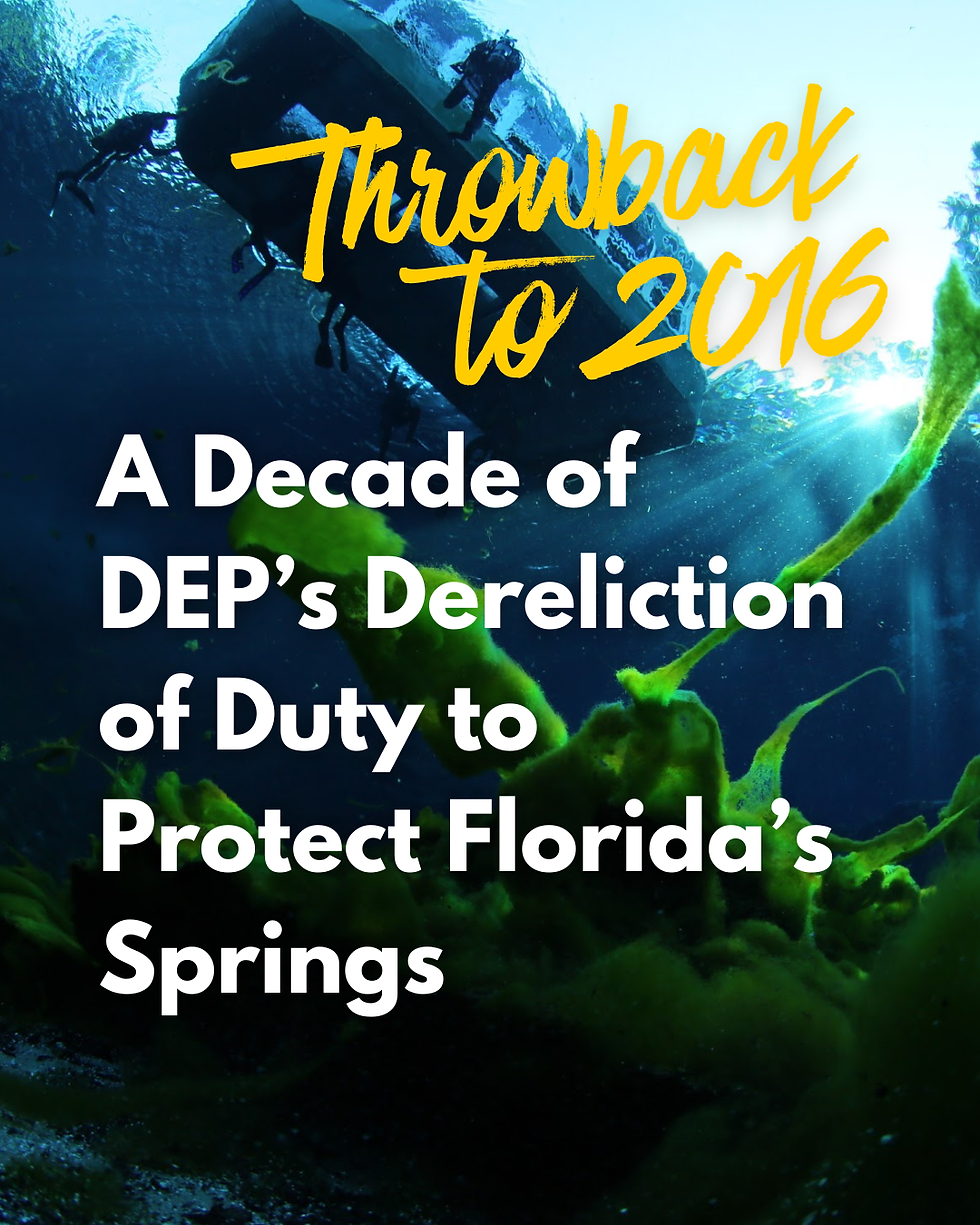Press Release: Clean Waterways Act is Greenwashing
- Brenda Wells, FSC communications specialist
- Feb 27, 2020
- 4 min read
Updated: Sep 22, 2022
FOR IMMEDIATE RELEASE
February 27, 2020
Contacts: Ryan Smart, Florida Springs Council, smarts421@gmail.com, 561-358-7191
David Cullen, Sierra Club, cullenasea@aol.com, 941-323-2404
Lisa Rinaman, St. Johns Riverkeeper, lisa@stjohnsriverkeeper.org, 904-509-3260
**PRESS RELEASE**
FLAWED CLEAN WATERWAYS ACT
GETS THE ROYAL GREENWASH
Today, in a press release from Senator Mayfield and Representatives Ingoglia and Payne, the “Clean Waterways Act” was declared “groundbreaking” but offered no facts to back up their claim. For more than three weeks, Florida Springs Council, Florida Waterkeepers, and Sierra Club have been asking Senator Mayfield to “fix” the bill, but two Committee Stops later, Senate Bill 712 remains fatally flawed.
Dave Cullen, Sierra Club lobbyist said: "Legislators always say, 'Don't oppose my bill; tell me how to make it better.' We did that. We wrote 18 amendments with rationales explaining why they are necessary and how the amendments would make Florida's laws for water quality better. They haven't pointed to a single error in what we've presented, but they reject it just the same. Apparently, it's just not politically possible. They even point out that big business likes the bill just as it is. The public should not expect improvements in our state's water quality any time soon unless this bill is amended for the better on the floor."
Ryan Smart, Florida Springs Council Executive Director, responded with:
“At the last Senate Committee Hearing on SB 712, more than a dozen volunteers from across Florida came to Tallahassee to ask for a stronger bill that would actually protect Florida’s springs and rivers. Two highly-paid lobbyists asked for the bill to be weakened to protect Nestlé’s right to extract huge amounts of spring water for free. Guess who got their way? SB 712 and HB 1343 are neither historic nor comprehensive. They fail to address the most significant sources of pollution to our springs and rivers and ensure
another generation of dirty water. They are the best bills polluters will allow, which is not nearly good enough to be worth celebrating.”
Jen Lomberk, Matanzas Riverkeeper, added: “Proponents of the bill laud the initiation of rulemaking to address things like septic systems and stormwater, but this is not a novel undertaking. Over ten years ago a technical advisory committee set out to update the stormwater rules, and after many presentations, workshops, and revisions, the rule was never adopted. Add that to the fact that the bill relies on the current BMAP program which itself has proven ineffective. Many BMAPs for Outstanding Florida Springs, which are significantly stronger than the BMAPs in SB 712, are only capable of achieving a small fraction of the pollution reduction necessary for clean water. Furthermore, the reliance on current best management practices to address agriculture pollution ignores the science and DEP’s own admission that these practices won’t achieve water quality goals. Top this off with grant programs subject to appropriations that, based on the legislature’s track record of funding conservation programs, may never come to pass, and reports and studies that will kick the can down the road for another 10 years, and you have a bill sorely in need of the fix we have been requesting.”
Cris Costello, Sierra Club Organizing Manager said: “Mayfield, Payne and Ingoglia say the bill is ‘the biggest comprehensive environmental package to have been introduced to the legislature in Florida’s recent history’ – but that isn’t saying much at all. The last so-called ‘comprehensive’ water bill was passed in 2016, and the environmental community – 52 organizations and coalitions from across the state – asked then Governor Rick Scott to veto it, because then, like today, the bill was window dressing only. This Clean Waterways Act is another greenwash for legislators and the Governor.”
Lisa Rinaman, St. Johns Riverkeeper, stated: “Toxic green algae outbreaks are increasing in duration and frequency threatening our waterways and our health. In 2019, the St. Johns River experienced more than 90 days of outbreaks impacting more than 50% of our River. This legislation will not offset rapid water quality deterioration and is not cause for celebration. Floridians deserve strong, enforceable water quality protections now.”
On February 3, the Florida Springs Council, Florida Waterkeepers, and Sierra Club sent a letter to Senator Mayfield and other legislators asking for 18 amendments to SB 712 that would address the most serious flaws with the bill. On February 12, in response to public comments made by Chief Science Officer Thomas K. Frazer regarding the bill, the same groups sent a twelve-page letter to Frazer that included a full and documented explanation of the bill’s many failures. Since February 3, responses, both formal and informal, from Senator Mayfield, DEP Secretary Noah Valenstein, and the Chief Science Officer have ignored the glaring inadequacies of this legislation.
We no longer have the luxury of taking incremental steps to try to address our water quality issues. We need strong, enforceable, science-based regulations that protect our waters now and SB 712 does not do that as it is currently written.
February 20, 2020 photos from Senate Appropriations Committee:
February 3, 2020 letter to Senator Mayfield: https://drive.google.com/file/d/1fvrc3oe0My5SdzQn- CYni6-7NS_O3Kwb/view?usp=sharing









